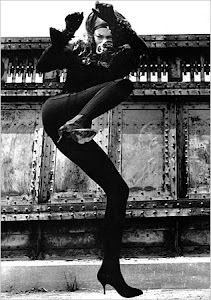I have never understood the term "the banality of evil". Having seen it, evil seems anything but banal; in fact, quite the opposite, creating a gushing, sickening wash of adrenalin that is perhaps addictive to some. That the perpetrators of real cruelty seem so casual about it might lead one to think that there is a banality to evil but even then the effect of the actions is so profound that their relative calm in the face of it seems to add to the horror. That one becomes inured to evil, or cruelty, is also nothing but a mask.
So why think about Hannah Arendt's apparently wise words now?
I have just watched, twice, a police interview almost exactly a year ago with serial rapist and killer Paul Bernardo. The police were questioning him about the 1990 disappearance and murder of Elizabeth Bain, as the man convicted of killing her, her boyfriend, has been freed by the courts and there is no one else around to take the blame.
Canada is a small country and once we have a star that star will serve for everything. Ralph Benmurgi is a TV personality of dubious merit who will always find a home somewhere on the CBC; you'd think only Margaret Atwood ever wrote a book and the poor woman is called upon for a quote about everything from what is "Canadian" (answer: a beer) to the weather; Anne Murray needs never record again and will still be our national songbird and we have the one good serial killer so let's let him fill in for every mystery remaining on the books.
Bernardo, I had been told by insiders, had gone to fat in the dungeon-like prison he will die in but that's not true -- the interview, broadcast today on national television, shows a man who looks somehow younger than he did at trial as though there is a picture in an attic somewhere growing more haggard and wrinkly by the day; he is thin as to seem delicate. I didn't cover all of his trial and so only heard his voice on tape as he was raping young girls, when there was a barely contained joy in it, and that joy was chilling. In the tape of his interview his voice is light, airy, slightly whiny, hardly scary at all except in its somewhat flat tone and weirdly feminine quality. He looks not like a vicious, sadistic torturer, rapist and slow murderer but rather like a guy who'd be beaten in the schoolyard just 'cause.
Is that what the banality of evil means? I don't find it that at all. He is terrifying for being so easily hidden, he really can pass for one of us. For a nothing-to-be-scared of less-than-us in fact.
I interviewed his last rape victim who lived, if living can be what you'd call it. She was nearly dead from the attack and police told me that they were convinced that whoever did this to her would murder the next victim, her injuries were such that their guess was he was scared off somehow. She spent the next weeks and months shattered, unable to leave her home, sleeping curled at the end of her parents' bed like a frightened dog. How did it happen that she was raped? She knew there was a rapist afoot in her neighborhood when she got off the bus late that night, someone got off right behind her. She turned around, scared, and saw Bernardo and thought "whew, I'm okay." THAT's how mild he looks.
Having heard the interview I would have to say I have no idea at all if he was lying or not. He didn't admit to abducting and killing Elizabeth Bain, a young university student who vanished one sunny afternoon and whose body has never been recovered. He seemed to have little interest in what was being asked of him and the police seemed to have little interest in asking it -- you have never seen or heard anything as deeply boring as a real police interview. I suspect they save the good stuff for when the recording machines are turned off. Given that he will live for the rest of his days in a 5x8 ft. cement box you would think he'd be willing to trade information on where her body can be found for cable TV or a lakeside view -- the dungeon he lives in is on the shores of Lake Ontario -- but it seems no such deal was offered. If he killed Bain he couldn't be assed to say so, and he couldn't be assed to deny it very vehemently. Why should he do either? Nothing much changes in his world and her parents' torment about simply not knowing what happened to her would matter not and nought.
Bernardo seems utterly harmless and yet is capable of unspeakable acts. The court artist who drew him daily during his trial suggested maybe he raped and then killed and then tortured-and-killed in an escalating madness simply so he could feel .... SOMETHING, to be relieved of the bland dullness to which an unfeeling psychopath is sentenced. So how perfect that his criminal sentence was not execution, but life -- actual life, not criminal justice life, he will never be released from prison in a small blank cell to the end of his endless days -- he has been sentenced to utter boredom. The worst and only torture for someone like him.
I think my own understanding of the banality of evil must be in this flat affect, that the only one who suffers is the victim and those around the victim, that the perpetrator apparently moves on to live much as he did before. Maybe in a nice flat somewhere, maybe in a prison cell. Maybe it doesn't matter. Evil only matters to the victim, the perpetrator will never hurt. He can't be made to hurt, he doesn't have the stuff. Victims of casual cruelty will suffer the more for this. Their pain cannot possibly be answered.
The living rape victims and the parents of the dead girls must be driven insane by thoughts of what Bernardo has done and what he has destroyed, and I liked the idea that Bernardo was sentenced to boredom, it seemed Biblically fitting, it seemed like it would really get to him, really drive him equally mad. But there is no justice. The calm and casual guy the police interviewed that day seems just fine. He is in prison, sure. He really doesn't seem to mind much.
Subscribe to:
Post Comments (Atom)












1 comment:
I think you are right about the mind of a psychopath.
Too bad I am not king. He would have felt something before leaving the world.
Post a Comment